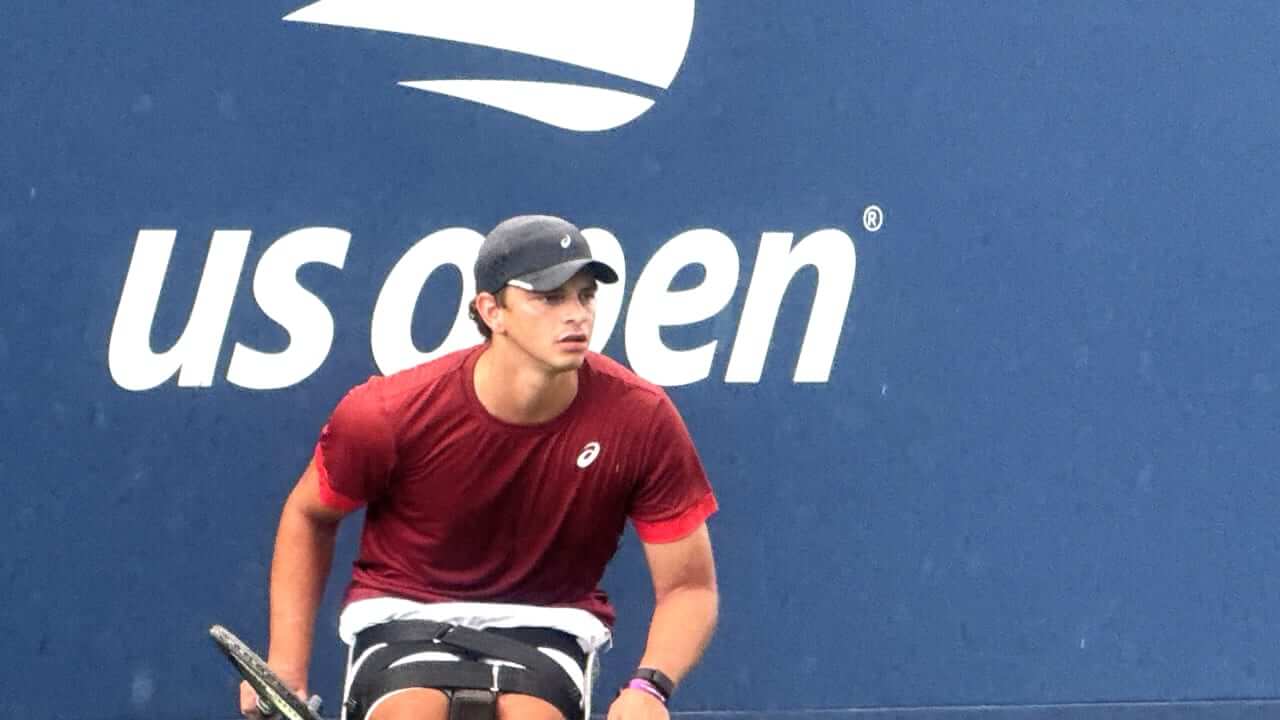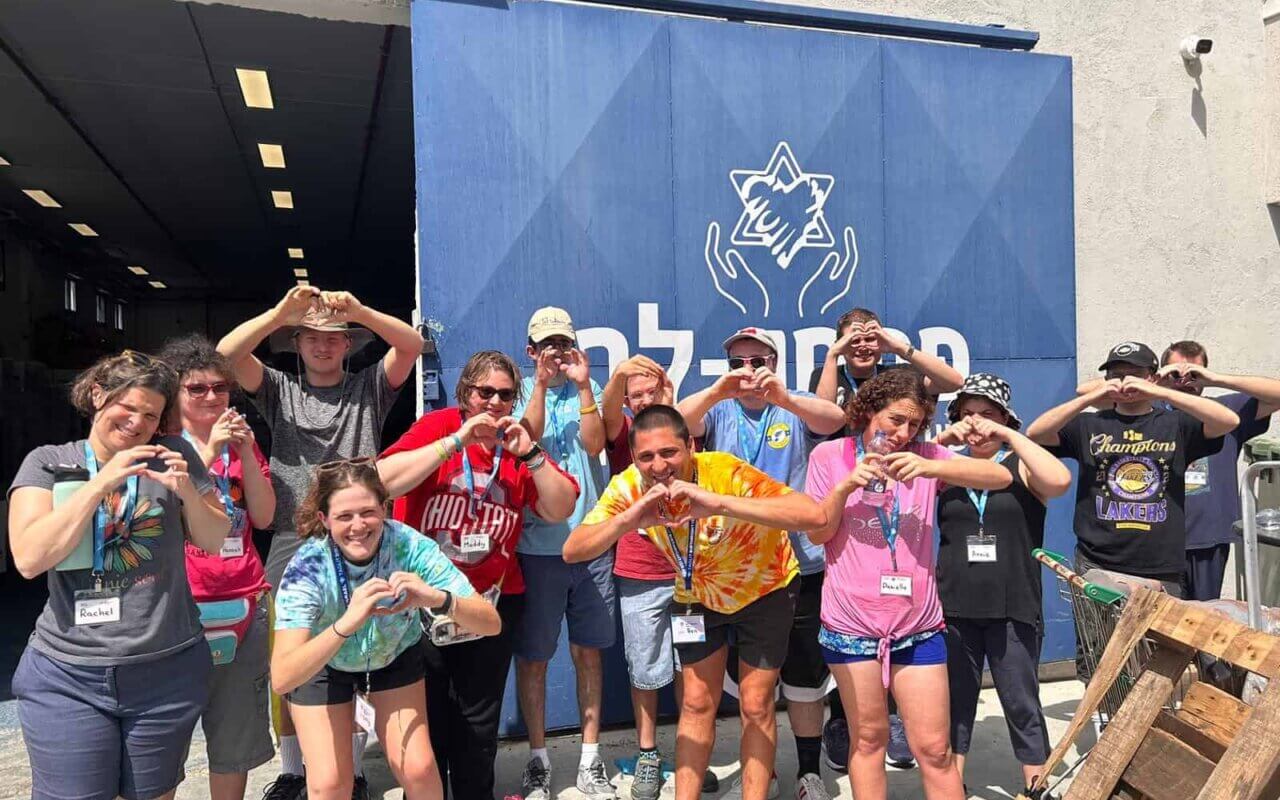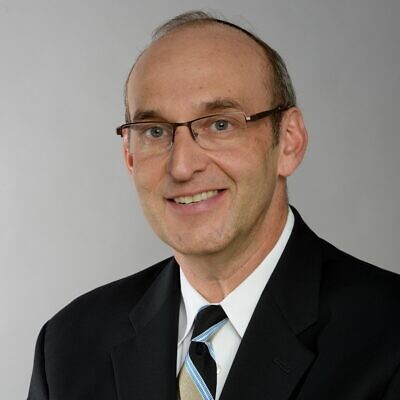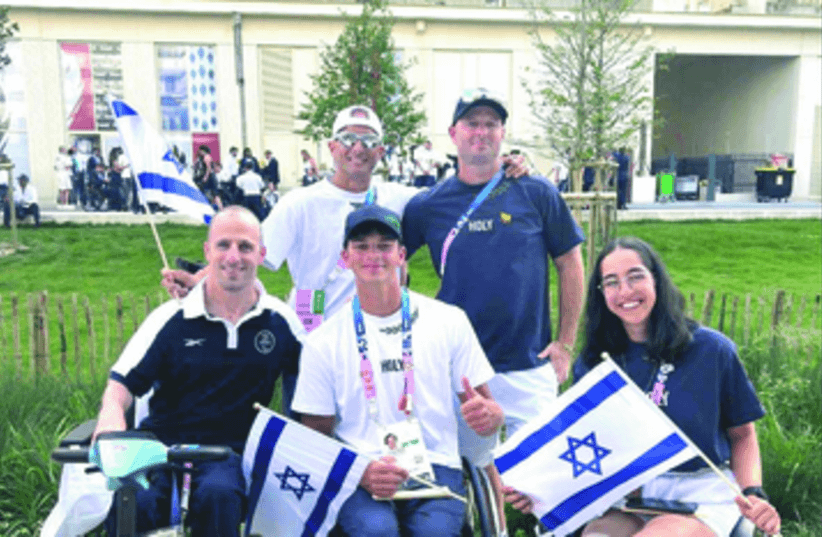Now, as he competes internationally, Lysov proudly represents Israel. His racket features an Israeli flag damper, and his tennis wheelchair is adorned with yellow ribbons as a tribute to the hostages
Appeared in Jerusalem Post, September 11th, 2025
New York – You could feel the love on Court 11 as 21-year-old Israeli wheelchair tennis player Sergei Lysov battled back from one set down in his first-round singles match at the US Open in New York.
The tall grandstand had only a handful of fans – most had just left after a four-hour men’s quarterfinal and many were heading over to see No. 2 Iga Swiatek take on Amanda Anisimova. But those who stayed to watch Lysov face American Conner Stroud very much wanted to be there. Many of them were cheering loudly for Lysov.In the crowd was a delegation from the Israel ParaSport Center in Ramat Gan, where Lysov trains. Retired Israeli tennis player Keren Shlomo, who works with many Israeli athletes, was courtside, encouraging him in Hebrew. She was filling in for Lysov’s regular coach, Ofri Lankri, who remained in Israel to care for her children while her husband served in the army reserves.
Also present was Guy Sasson, Israel’s quad wheelchair Grand Slam champion, who has become part mentor, part cheerleader, and part father figure for Lysov. Together with other Jewish and Israeli fans drawn to a court where “Israel” flashed on the scoreboard, they formed a close-knit tennis family for Lysov in New York.
A Google search for “Sergei Lysov” reveals little about his personal story – only his age (21), world rankings (No. 15 in singles and No. 21 in doubles), match record (169 wins and 96 losses), and career earnings. But those earnings got a significant boost after his impressive first appearance at the US Open, where he played both singles and doubles. By advancing to the quarterfinals, he earned $21,000.

AdvertisementLysov’s run began with a disappointing doubles defeat, as he and partner Daniel Rodrigues fell 6-2, 6-1 to Daniel Caverzaschi of Spain and Tom Egberink of the Netherlands.
His singles match against Stroud had a much better outcome. Stroud jumped to a 5-1 lead before closing out the first set 6-4. In the second, Lysov fell behind 2-1 but fought back to win it 6-4, with both sets lasting exactly 37 minutes.
In the decisive third set, which lasted just 25 minutes, Lysov stormed to a 5-1 lead behind serves topping 93 mph. He went on to close out the match 6-3, securing his first-ever Grand Slam singles win and a place in the quarterfinals against top seed Tokito Oda of Japan.
On Thursday, in front of an even larger group of supporters, Lysov fought valiantly against the hard-hitting Japanese lefty. Oda raced to leads of 3-0 and 5-1 in the first set, and although Lysov fired three aces and hit serves at 91 mph, his comeback fell short. In the second set, Lysov struck five more aces, rallied from 4-0 down to 5-2, but ultimately lost the one-hour, twelve-minute match 6-3, 6-2.
Despite the defeat, people were impressed.
“It was a pleasure to see him play and win his first Grand Slam singles match,” said Shlomo. “He is still young and I am sure that he will keep on working hard. The sky is the limit for him.
”Boaz Kramer, executive director of the Israel ParaSport Center and a two-time Paralympic silver medalist in tennis, agreed.“
Sergei’s win at the US Open is an important milestone, and I am sure it’s the first but not the last. He will bring us many more Grand Slam wins down the road. We are proud to provide this talented and hardworking young man with a comprehensive envelope of services that helps him fulfill his potential. Raising the Israeli flag through wheelchair sports around the world these days is more important and meaningful than ever. Am Yisrael Chai.”
Sasson, who has taken Lysov under his wing, was also full of praise.
Support for Israel in wartime
“He’s a great player, man, he’s a great guy, great kid. He has a lot of potential,” Sasson said of Lysov. “The level he’s at right now is a level that’s never been seen by an Israeli wheelchair tennis player. He’s still young and has a lot to give. It really depends how he develops and whether he becomes part of the upper tier. But he has the potential to be there. He has everything – he’s aggressive, with great groundstrokes, a strong serve, and excellent returns.”
Despite his growing popularity at the US Open, Lysov is still not well known beyond a small circle of tennis insiders. Shy and soft-spoken, he was hesitant to speak to the media. But in Hebrew, his second language, he patiently shared his story.
As a child in Russia, Lysov was a talented soccer player until, at age nine, he was diagnosed with Perthes disease, also known as Legg-Calvé-Perthes disease. The rare condition affects the hip joint when blood supply to the femur’s head is disrupted, leading to bone loss and eventual collapse. While many children recover with minimal complications, Lysov faced more extreme outcomes. Today, he can walk short distances but cannot play standing sports.
He recalls being taken out of his regular school in Russia because, as he put it, “the teachers didn’t feel able to support me.”He was transferred to a school that offered resources for children with physical disabilities, where he was introduced to wheelchair sports.“
They showed us bocce and swimming too. I chose tennis and swimming, then just tennis. It’s much more intense and competitive.”It was at a tournament in Moscow that he met Sasson, who told him about the Israel ParaSport Center – known by some as “Spivak” after an early donor – and connected him with Kramer. In 2019, at age 16, Lysov made aliyah with his family. “Spivak did it all for me and my family,” he said proudly.
The center helped the family find a home in Ramat Gan and supported his tennis career. He attended ulpan before enrolling in a boarding school, which he later left.
“They didn’t like the fact that I was always out of the country at tournaments. They thought it wasn’t good for the school’s reputation.”
Now, as he competes internationally, Lysov proudly represents Israel. His racket carries an Israeli flag damper, and his tennis wheelchair is decorated with yellow ribbons in tribute to the hostages in Gaza. He even reported for his Israel Defense Forces Tzav Rishon, the initial draft process.“
They took one look at me and said, ‘We’ll call you,’” he laughed. Still, he insists he is ready to serve in the IDF, perhaps in a computer-related role.
For now, though, his focus is tennis.“
I play every day,” he said, “except on Shabbat.”









